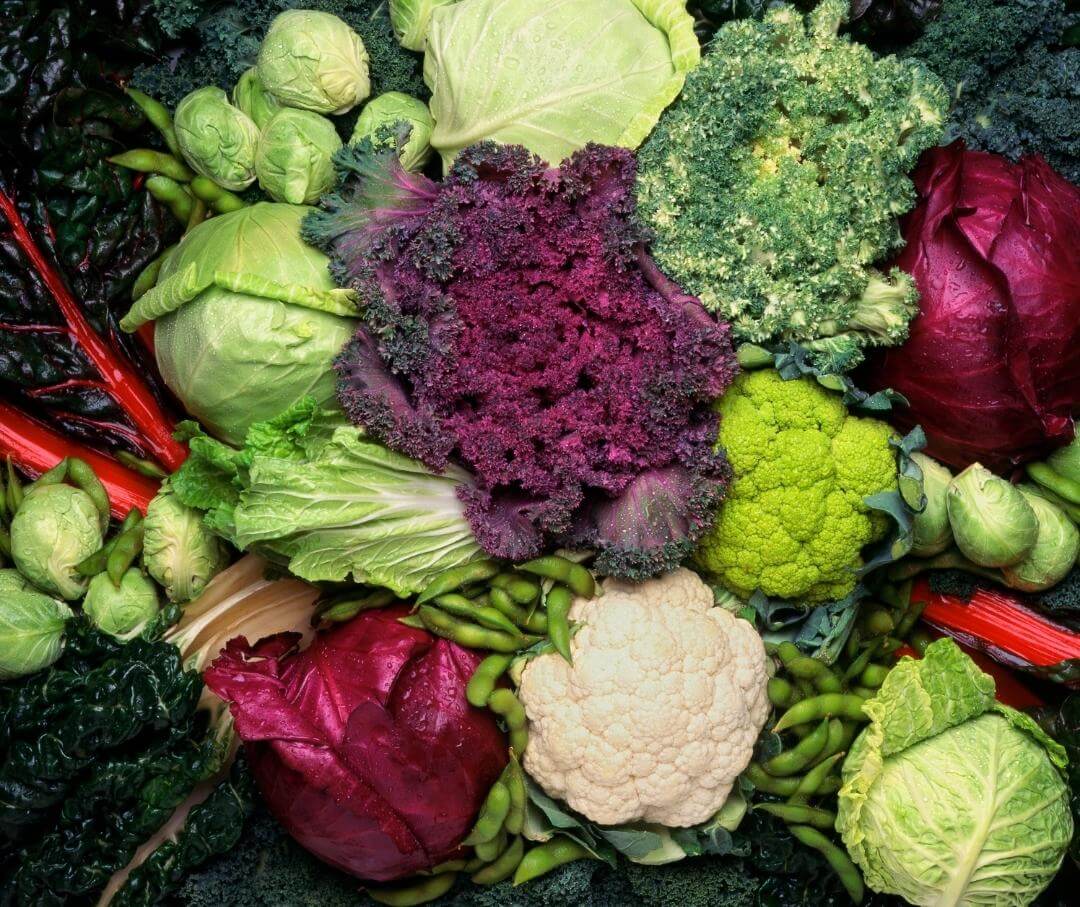If you’ve heard the myth that carbs are bad for you, or even if you’ve believed that myth to be true, you’re not alone. Carbohydrates are historically the most demonized macronutrient, being blamed for weight gain, diabetes, heart disease, and more, but this simply isn’t true. The reality is that carbohydrates are your body’s preferred and primary source of energy, helping you power through tough workouts, long work days, and all the fun you have in between. Eating enough of the right carbohydrates is essential for any healthy diet plan.
In this article, you’ll learn why you need carbohydrates, the different types of carbohydrates and what they do for your body, how to determine the amount of carbs you need, and ways to make smart carb choices for your health goals.
{{mid-cta}}
Understanding the Importance of Carbohydrates in Your Diet
Carbohydrates are one of three macronutrients your body relies on to function. Your digestive system breaks the complex or simple sugar molecules down into the simplest form, glucose, to provide energy to your brain, muscles, and organs. Without carbohydrates, your body relies on fat or protein stores for energy, which is not nearly as efficient and could result in muscle breakdown and loss.
Some carbohydrates are not digested and used as energy but play an equally important role in the body. Fiber helps to keep you full, stabilizes blood sugar, lowers blood cholesterol, normalizes bowel movements, and feeds gut bacteria for a healthy gut microbiome.
- Your body and brain prefer to use carbohydrates as their main energy source.
- Carbohydrates protect your muscles from breakdown. Without enough energy from carbohydrates, the proteins in your muscles are broken down into amino acids that are used for energy production.
- Some carbohydrates support gut health by providing prebiotic fibers for the bacteria in your digestive tract.
- Regularly eating complex carbohydrates helps stabilize blood sugar levels and can help regulate your appetite.
- Carbohydrates add versatility and flavor to meals.
- Some carbohydrates can help lower blood sugar and blood cholesterol.
- Fiber, a form of carbohydrate, prevents constipation and encourages regular bowel movements.
- Whole grains provide numerous essential nutrients like B vitamins, iron, copper, zinc, magnesium, and antioxidants.1
- Diets high in complex carbohydrates such as fruit, vegetables, whole grains, and legumes are associated with lower rates of dementia and better cognitive function.2
Carbohydrates 101

You know your body uses carbohydrates for energy, but what are carbohydrates, and how do they work? They're one of the three macronutrients (alongside fats and proteins) that our bodies need in large amounts to function. Carbohydrates are made up of sugar molecules, which the body breaks down into glucose, a simple sugar your body uses for energy.
Here are some examples of foods that include primarily carbohydrates.
- Whole Grains: Foods like quinoa, brown rice, and oats. These foods are high in fiber and complex carbohydrates, which keep you full and satisfied.
- Fruits: Apples, bananas, and berries, among other fruits, contain fiber, natural sugars, and essential nutrients.
- Vegetables: While some vegetables are non-starchy and low in carbohydrates, others are great sources. Potatoes, corn, and squash are a few of the starchy vegetables that are rich in carbohydrates.
- Legumes: Beans, lentils, and peas are rich in carbohydrates and also a great source of plant protein.
- Dairy: Milk, yogurt, and other dairy products have lactose, a natural sugar and carbohydrate.
- Bread and Pasta: Starchy foods like bread and pasta are high in carbohydrates and can also be a good source of dietary fiber, vitamins, and minerals if you choose whole-grain varieties instead of refined grains.
<p class="pro-tip"><strong>Also Read: </strong><a href="how-many-carbs-should-type-2-diabetic-eat-daily">Carb Counting: How Many Carbs Can a Diabetic Have Daily?</a>.</p>
Understanding the Different Types of Carbohydrates
There are two main types of carbohydrates: simple and complex. Simple carbs include sugars that break down quickly and give your body a quick energy boost.
Complex carbs, like fiber and starch, take longer to break down, providing a steady stream of energy to your body. This makes them important for feeling full and energized throughout the day and slowly releasing sugar into the bloodstream.
Sugar
Sugar is found in sweet treats, pastries, soda, and candy, but it is also found in other, more nutrient-rich foods. Sugar, along with other essential vitamins, minerals, and antioxidants, is naturally found in foods like fruit, vegetables, and dairy.
Sucrose is table sugar that’s added to foods to make them sweeter. Fructose is found in fruit, and lactose is found in milk and milk products. Each of these sugars is quickly broken down into glucose, which travels through the blood to be used by the body for energy.
Starch
Starch is a complex carbohydrate (more sugar molecules connected together) that’s found in foods like potatoes, corn, whole grains, and cereals. Starchy foods take longer to break down, giving you longer-lasting energy and helping you feel full for longer.
Fiber
Fiber is a type of carbohydrate that your body is unable to break down to use as energy. Fruits, vegetables, whole grains, and legumes are high in fiber. Even though it can’t be digested, fiber plays an important role in your health.
Fiber slows down digestion, helping to regulate hunger and slow down the release of sugar into the bloodstream. Some fiber helps to feed the bacteria in your digestive tract, improving the diversity and health of your gut microbiome. Current recommendations for fiber are to get 14 grams for every 1,000 calories eaten.3
Insoluble fiber acts as roughage that brushes through your digestive tract, adding bulk to stool and helping to keep bowel movements regular. The other type of fiber, soluble fiber, helps to lower blood cholesterol by absorbing certain fats from the food you eat and preventing them from building up in the bloodstream.
Determining Your Carbohydrate Requirements

The Dietary Guidelines for Americans recommends getting 45 to 65 percent of your calories from carbohydrates for a healthy, balanced diet. On a 2,000-calorie diet, this would be 225 to 325 grams of carbohydrates per day. Getting at least 45 percent of your calories from carbohydrates can help you reach your fiber goals and get plenty of essential vitamins, minerals, and antioxidants from fruits and vegetables.3
An observational study of over 15,000 people found that people who ate low-carb diets (less than 40% of calories from carbs) and people who ate high amounts of carbohydrates (over 70 percent of calories) have an increased risk of mortality while eating 50 to 55 percent of calories from carbohydrates resulted in the lowest risk of mortality.4
To find how many carbohydrates you need, multiply the number of calories you eat daily by 0.45 and again by 0.65. Then, divide those two numbers by 4 to find the range of grams of carbohydrates you should be getting each day.
If you’re unsure how many carbohydrates you need to meet your unique health goals, speak with a dietitian and your physician. They can help you develop a meal plan that best meets your health needs.
Smart Carbohydrate Selection: Optimal Choices for Health
While carbohydrates undoubtedly benefit health, it’s important to choose the right ones. Here are some simple, smart choices you can make when choosing healthy carbohydrates.
- Limit Your Added Sugars: The Dietary Guidelines for Americans recommends limiting added sugars to less than 50 grams per day, while the American Heart Association has even stricter recommendations of 36 grams for men and 25 grams for women.5 Eating too many added sugars from foods like candy, desserts, and sugar-sweetened drinks can increase your risk of heart disease, diabetes, weight gain, and cavities.6
- Prioritize Fiber-Rich Fruits and Vegetables: Fruits and veggies like raspberries, bananas, apples, potatoes, eggplant, and Brussels sprouts are high in fiber, vitamins, minerals, and antioxidants. While they do have natural sugars, the fiber helps to slow down the release of sugar into your bloodstream for stable, long-lasting energy.
- Choose Whole Grains Whenever Possible: choosing whole-grain bread, pasta, and cereals instead of refined carbs adds more fiber and nutrients to your diet. A slice of whole grain bread will digest more slowls and help you feel more full than a slice of white bread.
- Eat More Beans, Peas, and Lentils: Pulses (the edible seed from a legume plant) are rich in fiber, protein, and nutrients like iron, B vitamins, magnesium, and other nutrients. These foods can help you feel full, which is beneficial for weight loss, and add a significant amount of fiber and protein to your diet.
Learn More About How to Improve Blood Sugar Health With Signos’ Expert Advice
Making smart carbohydrate choices can help you enjoy delicious foods, feel more energized, regulate your hunger, and meet your health and wellness goals. Signos’ expert advice can help you choose the right foods for your body to improve your health, manage diabetes, and reach your weight goals. You can learn more about managing your blood glucose on Signos’ blog and take a quick, free quiz to learn if Signos is a good fit for you.
<p class="pro-tip"><strong>Learn More: </strong><a href="low-carb-banana-bread">Low-Carb, Low-Glycemic Banana Bread Recipe</a>.</p>
- Item 1
- Item 2
- item 3
Topics discussed in this article:
References
- The Nutrition Source. (n.d.). Whole Grains. Harvard T.H. Chan School of Public Health. https://www.hsph.harvard.edu/nutritionsource/what-should-you-eat/whole-grains/
- Ooi, C. P., Loke, S. C., Yassin, Z., & Hamid, T. A. (2011). Carbohydrates for improving the cognitive performance of independent-living older adults with normal cognition or mild cognitive impairment. The Cochrane database of systematic reviews, 2011(4), CD007220. https://www.ncbi.nlm.nih.gov/pmc/articles/PMC7388979/
- U.S. Department of Agriculture & U.S. Department of Health and Human Services. (2020). Dietary Guidelines for Americans, 2020-2025. https://www.dietaryguidelines.gov/sites/default/files/2020-12/Dietary_Guidelines_for_Americans_2020-2025.pdf
- Seidelmann, S. B., Claggett, B., Cheng, S., Henglin, M., Shah, A., Steffen, L. M., Folsom, A. R., Rimm, E. B., Willett, W. C., & Solomon, S. D. (2018). Dietary carbohydrate intake and mortality: a prospective cohort study and meta-analysis. The Lancet. Public health, 3(9), e419–e428. https://pubmed.ncbi.nlm.nih.gov/30122560/
- American Heart Association. (2021, November 2). Added Sugars. https://www.heart.org/en/healthy-living/healthy-eating/eat-smart/sugar/added-sugars
- Paglia L. (2019). The sweet danger of added sugars. European journal of paediatric dentistry, 20(2), 89. https://pubmed.ncbi.nlm.nih.gov/31246081/
































